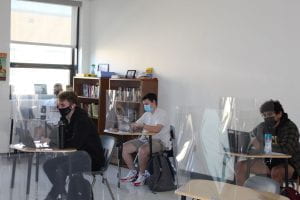
Students at the Independence High School attending a Hybrid class in the building while others are still learning virtually.
Independence High School began hybrid learning — a mix of in-person and online learning — on March 3. Many students chose to learn entirely online this year, and others are spending four days in-person and the rest at home, while Mondays remain asynchronous for all students.
“I was excited that I would get to see people in person, especially my teachers. Learning online was hard without the teachers being in person to answer any questions,” said sophomore Sucheta Parthasarathy.
Many students and teachers are grateful that schools have opened back up again as some students were struggling with distance learning because of the lack of concentration at home. “Everything being online, like homework and lessons, had really strained my eyes, making it difficult to look at the screen for long periods of time. In the beginning of distance learning, there were a lot of technical issues, such as video lags and being kicked out of Google Meets,” said Parthasarathy.
Being in distance learning requires students to have good connectivity to the internet and reliable access to technology. Such requirements made it difficult for some to stay completely in virtual learning.
Teaching in distance learning also posed challenges to teachers. “It is very hard to teach math online because in class — if you have a quick math question — it is easy to just do it on the board and just walk through it step by step. It is harder to do that online because I have to open up apps and share my screen and do this quick math thing,” said Ms. Vanessa Wagener. “But the hardest part is definitely not being able to see your students in person.”
Hybrid learning can be the best decision for some students and teachers after a year online throughout the pandemic. Schools can keep students and staff safe while providing them with valuable in-person learning. “Having two days for distance learning and two days for being in person could really benefit students to ask any questions that they couldn’t do at home,” said Parthasarathy.
Some teachers feel similarly. “It benefits teachers because communication is easier; if a student is missing work or submitted something incorrectly, it is easier to be in-person to inform them whereas online… you can try to send emails, you can try to keep the student after class, but sometimes it is hard, especially with the technology,” said Wagener.
Students and teachers in hybrid learning environments also need to stay safe as possible from COVID-19 by taking precautions. Wearing a mask, sanitizing hands and surfaces, and maintaining social distance can be done to prevent the spread. Parthasarathy suggests, “Keeping your mask on for as long as possible and keeping a good amount of distance between other students can prevent an outbreak. Don’t share any materials or food, and always use hand sanitizer after each block.”
One of the benefits of hybrid learning is the potential to reduce student absences. If students feel physically unwell to attend school in person, they may still attend the class online, meaning they no longer have to miss out entirely.